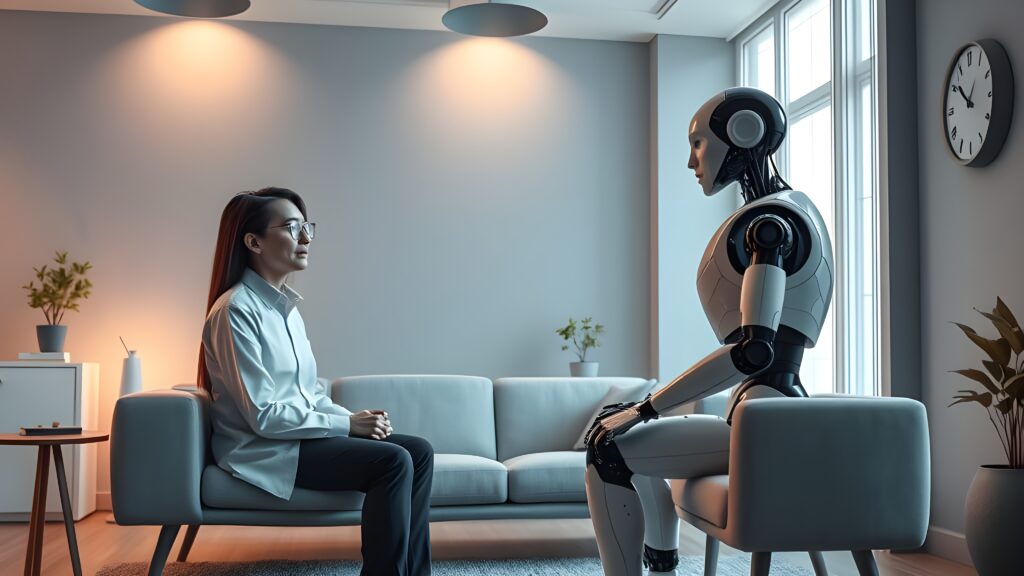
Introduction
2025 is the year of rapid tech shifts. Artificial Intelligence (AI) is booming. It’s everywhere—education, finance, even creative writing. And yes, it’s knocking on the doors of therapy rooms.
But mental health professionals? Many are skeptical.
Why?
While some celebrate AI’s progress in mental healthcare, others raise serious concerns. Trust, ethics, empathy, and safety form the core of their hesitation. In this article, we explore why mental health experts remain cautious about AI—despite its power and promise.
Let’s dive deep into the real fears, stories, and reasons behind this resistance.
1. Empathy Can’t Be Coded
AI can simulate speech. It can analyze moods. It even suggests coping techniques. But empathy? That’s human.
Therapists spend years learning to connect. Not just listening, but feeling.
Real Life Example:
Dr. Meera, a licensed clinical psychologist in New York, tried an AI therapy assistant. A client with PTSD used it for six weeks. “It kept repeating surface-level affirmations. My client said, ‘I felt more alone talking to it than in silence.’ That scared me,” Dr. Meera shared.
Words can be generated. But human presence can’t.
2. Privacy Worries Are Sky-High
Mental health is deeply personal. Clients share secrets they wouldn’t tell their closest friends.
With AI, where does that data go?
Even with encryption, fear of misuse or leaks looms large. In 2025, data is currency. And mental health records? Priceless.
Trending Concern:
Many apps still don’t clearly disclose how data is stored or shared. This breaks trust. Professionals demand transparency, and AI has yet to earn it.
3. Bias in Algorithms
AI learns from data. But data is biased.
It often reflects societal stereotypes—racial, gender, and cultural. For therapists, this is dangerous. A biased suggestion can damage a vulnerable client.
Real Life Case:
In 2024, a popular AI wellness chatbot was found to give different advice to users based on names that sounded “ethnic.” The company apologized. But the damage was done.
Mental health should be safe for all. AI still has a long way to go.
4. Ethics and Accountability
Who takes the blame when AI goes wrong?
A misdiagnosis. A poor suggestion. A delayed response to a suicide risk.
With humans, there’s accountability. Licenses. Regulations. Boards.
With AI? Grey areas.
Therapists argue that without strong ethical frameworks, AI is a liability, not a tool.
5. Job Anxiety + Professional Devaluation
Let’s face it—AI is fast. Cheap. Scalable.
This has led to fears of replacement.
Therapists worry: “Will apps replace me?” “Will patients choose AI over human care just to save money?”
But even deeper is a fear of being devalued. That years of training, intuition, and compassion could be reduced to lines of code.
Mental health isn’t a transaction. It’s a relationship.
6. Lack of Regulation
2025 has seen AI growth outpacing policy.
Mental health tech tools are exploding. But regulation?
Still catching up.
Many therapists avoid AI tools simply because they’re not yet vetted by credible health authorities.
Without clear guidelines, mental health professionals prefer to stay cautious than sorry.
7. Healing Needs Human Nuance
Therapy is art as much as science. Silence. Body language. Tone. Intuition.
These can’t be replicated by chatbots.
Real Life Moment:
Sam, a trauma survivor, shared how his therapist noticed his trembling hands. She paused. Reached out. That moment? Healing.
Could AI have sensed that? Not in 2025.
8. Over-Reliance by Clients
Some users are turning to AI instead of therapy, not as a supplement.
This worries professionals. Why?
Because AI doesn’t always detect emergencies. It may not catch suicidal thoughts. It may minimize complex disorders.
Therapists warn that AI is a support tool, not a substitute. Misuse can be dangerous.
Conclusion
AI is powerful. It’s fast. It offers hope.
But mental health professionals know healing is delicate. It’s personal. It’s sacred.
In 2025, skepticism doesn’t mean rejection. It means caution rooted in care.
Therapists aren’t anti-tech. They’re pro-trust. Pro-ethics. Pro-human.
For AI to truly help in mental health, it must earn that trust, not assume it.
Only then can it serve as an ally, not a threat.
Frequently Asked Questions (FAQs)
Q1. Can AI replace therapists in the future?
No. AI can support therapists with tools and analysis but cannot replicate human empathy, intuition, or lived experience.
Q2. Are there any ethical AI tools therapists trust?
Yes, some tools (like Woebot or Wysa) are gaining trust but only when used alongside traditional therapy—not as a replacement.
Q3. Is AI in therapy dangerous?
AI can be unsafe if used improperly—especially in crisis situations. It lacks real-time judgement and empathy.
Q4. Why is there so much buzz around AI therapy apps then?
Accessibility and affordability. AI tools are available 24/7 and cheaper, making them attractive—but not always effective or safe for deeper issues.
Q5. Will AI ever become emotionally intelligent?
It may simulate emotion, but true emotional intelligence—rooted in lived human experience—is uniquely human.
Final Words
Mental health is not just about logic or language. It’s about presence. Warmth. Trust.
AI may walk beside therapists. But it can’t walk in their shoes.
In 2025, skepticism isn’t fear of the future. It’s a demand for a future built on ethics, equity, and empathy.
And that’s something only humans can lead.
